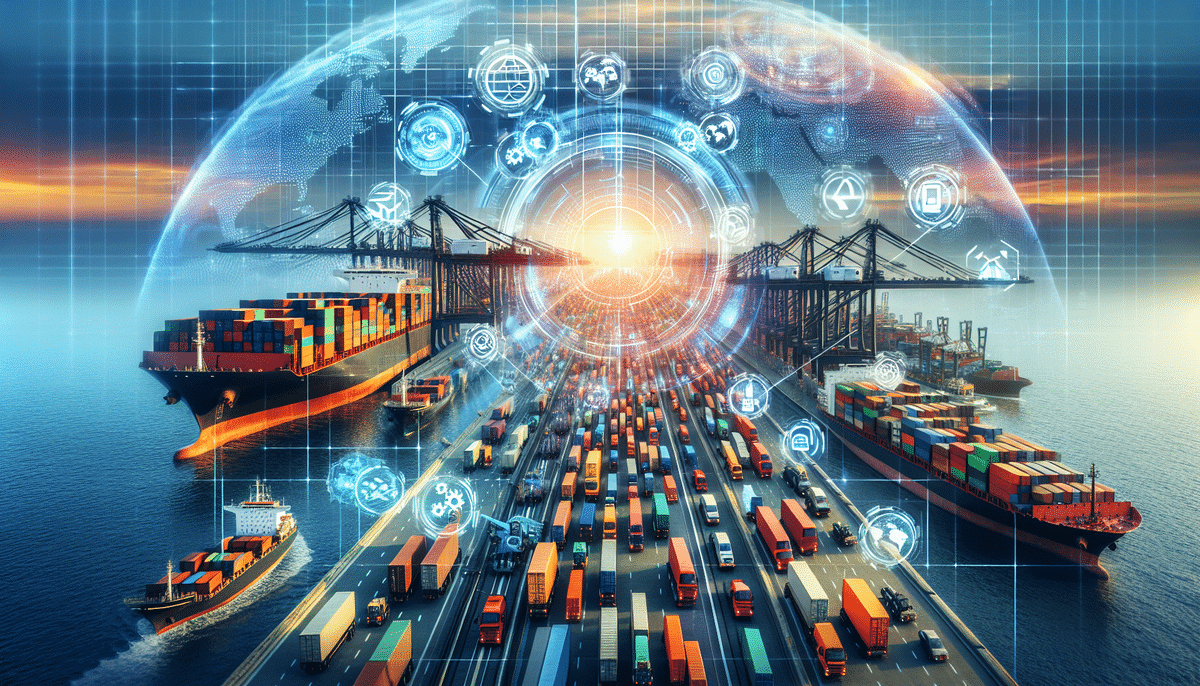Global Bottlenecks Threaten Ecommerce Logistics: How to Overcome Them
As global commerce continues to boom, ecommerce logistics have become a critical component for the successful operation of businesses. However, the increasing complexity of global trade has led to challenges that threaten to undermine ecommerce logistics. These challenges are commonly referred to as global bottlenecks, and they pose significant risks for businesses operating in the ecommerce space.
Understanding the Impact of Global Bottlenecks on Ecommerce Logistics
Global bottlenecks affect ecommerce logistics by creating roadblocks that hinder the flow of goods from the supplier to the buyer. These bottlenecks can manifest in various forms, such as transportation disruptions, supplier delays, customs clearance problems, and inadequate infrastructure. According to a report by ShipScience, these issues can increase operational costs by up to 15% and result in potential revenue losses of millions annually.
One way to mitigate the effects of global bottlenecks on ecommerce logistics is to diversify suppliers and transportation methods. By having multiple suppliers and transportation options, businesses can reduce their reliance on a single source and avoid disruptions caused by bottlenecks. Additionally, businesses can invest in technology and data analytics to better predict and manage potential bottlenecks. This can include using real-time tracking and monitoring systems to identify and address issues before they become major problems. Overall, understanding the impact of global bottlenecks on ecommerce logistics and taking proactive measures to address them is crucial for businesses to maintain a competitive edge in the global marketplace.
The Role of Supply Chain Management in Overcoming Global Bottlenecks
Supply chain management plays a vital role in overcoming global bottlenecks. Effective supply chain management requires a robust understanding of the logistical processes involved in moving goods from one point to another. By analyzing these processes, supply chain managers can identify potential bottlenecks and proactively take measures to avoid them. According to a study by McKinsey & Company, companies with advanced supply chain strategies are 50% more likely to mitigate disruptions successfully.
Another critical aspect of supply chain management is risk management. Supply chain managers must be able to identify and mitigate risks that could disrupt the flow of goods, including natural disasters, political instability, and economic downturns. By having contingency plans in place, supply chain managers can minimize the impact of these risks and ensure that goods continue to move efficiently.
Furthermore, supply chain management can also play a significant role in sustainability efforts. By optimizing transportation routes, reducing waste, and using eco-friendly packaging, supply chain managers can reduce the environmental impact of the logistics process. This not only benefits the planet but can also lead to cost savings and improved brand reputation.
The Importance of Global Trade Agreements in Ecommerce Logistics
Global trade agreements can help reduce the impact of bottlenecks on ecommerce logistics. Many countries have entered into trade agreements that facilitate the movement of goods across borders by reducing tariffs, customs clearance procedures, and other bureaucratic impediments. These agreements make it easier and more cost-effective for businesses to engage in cross-border trade. By ensuring compliance with global trade agreements, businesses can benefit from more seamless ecommerce logistics.
Moreover, global trade agreements also promote fair competition among businesses. When countries agree to reduce trade barriers, it creates a level playing field for businesses of all sizes. This means that small businesses can compete with larger ones on an equal footing, which can lead to increased innovation and better products for consumers.
Additionally, global trade agreements can have a positive impact on the economies of participating countries. By increasing trade, countries can benefit from increased economic growth and job creation. This can lead to improved living standards for citizens and a more stable global economy.
Analyzing the Top Global Bottlenecks That Affect Ecommerce
Global bottlenecks can occur at any stage of the ecommerce logistics process. However, some bottlenecks are more common than others and pose a greater risk for businesses. Examples of top global bottlenecks include:
- Transportation disruptions
- Poor infrastructure
- Trade restrictions
- Supplier delays
Understanding these bottlenecks is critical to identifying potential risks and developing effective strategies to overcome them.
One of the most significant bottlenecks that affect ecommerce is the lack of standardization in customs procedures across different countries. This can lead to delays and additional costs for businesses, as they have to navigate different regulations and requirements for each country they operate in. Another bottleneck is the increasing demand for sustainable and eco-friendly packaging, which can be more expensive and difficult to source than traditional packaging materials.
Despite these challenges, there are several strategies that businesses can adopt to mitigate the impact of bottlenecks on their ecommerce operations. These include:
- Investing in technology to streamline logistics processes
- Building strong relationships with suppliers and partners
- Diversifying their supply chains to reduce reliance on any one supplier or region
By taking a proactive approach to identifying and addressing bottlenecks, businesses can ensure that their ecommerce operations remain efficient, cost-effective, and competitive in the global marketplace.
Strategies for Mitigating the Effects of Global Bottlenecks on Ecommerce Logistics
Businesses can adopt several strategies to mitigate the effects of global bottlenecks on ecommerce logistics:
- Develop Robust Risk Management Strategies: Account for potential bottlenecks by having contingency plans and backups in place to ensure continuity in operations.
- Collaborate with Stakeholders: Work closely with suppliers, logistics providers, and other stakeholders to coordinate activities and optimize workflows.
- Leverage Technology: Use technology to automate the logistics process, enhance visibility, and track performance throughout the ecommerce supply chain.
- Diversify Supply Chains: Source materials and products from multiple regions to reduce the impact of bottlenecks in any one area.
- Invest in Training: Enhance employee skills and knowledge in logistics management to better navigate complex global challenges.
It is also important for businesses to stay informed about global trends and developments that may impact ecommerce logistics. This includes monitoring changes in trade policies, transportation regulations, and geopolitical events that may affect the movement of goods. By staying up-to-date on these issues, businesses can proactively adjust their logistics strategies and minimize the impact of bottlenecks on their operations.
Innovative Solutions to Overcome Ecommerce Logistics Bottlenecks
Innovative solutions can help businesses overcome ecommerce logistics bottlenecks. For example:
- Blockchain Technology: Enhances transparency, security, and data integrity within the supply chain.
- Collaborations with Logistics Startups: Leverages cutting-edge technology to solve logistics challenges.
- New Supply Chain Models: Such as the sharing economy and crowdsourced logistics to achieve operational efficiencies.
- Artificial Intelligence (AI): Optimizes supply chains by predicting demand, identifying potential disruptions, and automating processes.
By using AI-powered tools, businesses can reduce costs, improve delivery times, and enhance customer satisfaction. Moreover, AI can provide real-time insights into logistics operations, enabling businesses to make data-driven decisions and continuously improve their processes.
Leveraging Technology to Improve Ecommerce Logistics Amidst Global Bottlenecks
Technology plays a significant role in improving ecommerce logistics amidst global bottlenecks:
- Internet of Things (IoT): Tracks shipments and monitors inventory levels in real-time.
- Warehouse Management Systems: Optimize warehouse operations and improve efficiency.
- Predictive Analytics: Anticipates potential bottlenecks and allows for preemptive action.
Implementing these technologies can lead to more resilient and responsive logistics operations.
Collaborating with Stakeholders to Tackle Global Bottlenecks in Ecommerce Logistics
Collaboration with stakeholders is crucial for tackling global bottlenecks in ecommerce logistics. Businesses can work with:
- Logistics providers
- Suppliers
- Governments
- Trade organizations
Such collaborations enable stakeholders to share information and best practices, identify bottlenecks, develop solutions, and implement them collaboratively. Additionally, businesses can partner with logistics providers that offer end-to-end logistics solutions, ensuring a streamlined and efficient supply chain.
Balancing Cost and Efficiency in Addressing Global Bottlenecks for Ecommerce Businesses
Managing costs is a significant challenge for businesses seeking to overcome global bottlenecks. However, businesses must strike a balance between cost and efficiency to remain competitive in the ecommerce space. Strategies include:
- Integrating Sustainability Principles: Reduce carbon emissions, minimize waste, and optimize resource use.
- Optimizing Transportation Routes: Enhance efficiency and reduce costs.
- Implementing Eco-Friendly Packaging: Although more expensive, it can lead to long-term savings and improved brand reputation.
By enhancing sustainability, businesses can improve their bottom line while reducing the ecological impact of their logistics operations.
The Future of Ecommerce Logistics amidst Increasing Globalization Challenges
Ecommerce logistics will continue to face significant challenges as global trade becomes more complex. The increasing popularity of online marketplaces and the globalization of supply chains will continue to create bottlenecks. However, businesses can overcome these challenges by:
- Embracing technology
- Adopting innovative supply chain models
- Collaborating with stakeholders
Businesses must continuously evaluate their logistics processes to remain competitive in a rapidly changing ecommerce landscape.
Case Studies: How Leading E-commerce Companies are Tackling Global Bottlenecks in their Supply Chains
Leading ecommerce companies have implemented various strategies to overcome global bottlenecks in their supply chains. For instance:
- Amazon: Invested heavily in autonomous robots, drones, and advanced analytics to enhance the efficiency and speed of their logistics operations.
- Alibaba: Leveraged cross-border trade agreements to expand their reach into new markets.
Understanding how these companies are tackling global bottlenecks can provide valuable insights for other businesses.
Measuring the Impact of Overcoming Global Bottlenecks on Your Business’s Bottom Line
Overcoming global bottlenecks can have a significant impact on a business's bottom line. By enhancing logistics efficiency and reducing the risks associated with bottlenecks, businesses can improve their revenue and profitability. It is essential to measure the impact of overcoming global bottlenecks to justify the investment required to implement effective logistics solutions. Businesses can measure impact by tracking metrics such as:
- Delivery times
- Inventory turnover
- Shipping costs
- Customer satisfaction
Best Practices for Managing and Succeeding in the Age of Globalized E-commerce and Logistics
Best practices for managing and succeeding in the age of globalized ecommerce and logistics include:
- Adopting a Customer-Centric Approach: Pay close attention to customers' needs, preferences, and expectations to provide a seamless and personalized experience.
- Investing in Technology: Drive operational efficiencies, improve decision-making, and enhance customer experience.
- Collaborating with Stakeholders: Identify bottlenecks and develop effective solutions through collaboration.
- Embracing Sustainability Principles: Minimize ecological footprint and build a more resilient supply chain.
By following these best practices, businesses can navigate the complexities of globalized ecommerce and logistics, ensuring long-term success and growth.
In conclusion, global bottlenecks pose significant risks for businesses operating in the ecommerce space. However, businesses can overcome these challenges by understanding the impact of bottlenecks, adopting effective strategies, and collaborating with stakeholders. By embracing technology, sustainability, and innovation, businesses can create more agile and reliable logistics operations that enhance the customer experience, drive revenue, and promote long-term business success.






















